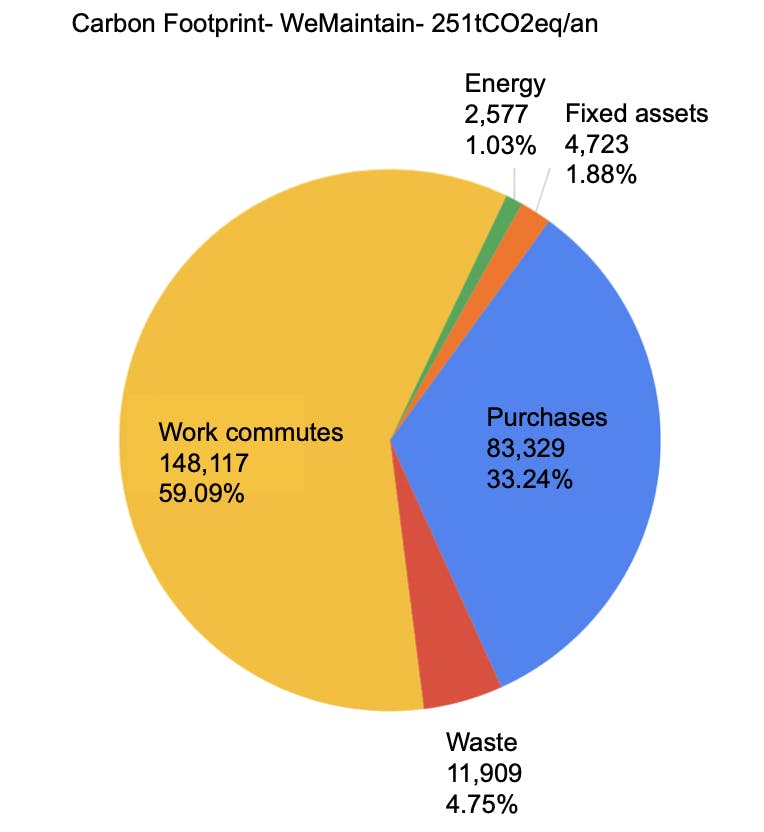
ESG at WeMaintain: results, strategy and actions
ESG criteria are experiencing a real boom and make it possible to report on the extra-financial performance of companies. ESG is divided into three main categories: environmental impact, social impact and corporate governance. The growing popularity of these indicators goes hand in hand with a progressive awareness of environmental and social issues on the part of consumers and employees who are ready to commit themselves as partners in this transition.
The Intergovernmental Panel on Climate Change (IPCC) reaffirmed in its special report the urgency of achieving carbon neutrality by 2050 to limit global warming to +1.5°C above pre-industrial levels. Adopted at COP 21 in 2015, the Paris Agreement formalised this objective and 196 parties committed to undertake ambitious efforts to combat climate change. At the national level, the UK has launched the "Sixth Carbon Budget" which consists of reducing GHG emissions by 78% by 2035 compared to 1990 levels. These objectives represent an opportunity to initiate a transition in the real estate sector, which has long been heavily dependent on fossil fuels.
At WeMaintain, we are aware of the climate emergency. We know that the building sector is the second largest emitter of greenhouse gases in France and that construction products and equipment pollute throughout their life cycle. For example, air conditioning has become a reflex for many of us. Sales rise with the temperature but remember that an air-conditioning system is a heat pump that takes warm air from indoors and expels it outside, creating urban heat islands. In 2012, researchers from the CNRS and Météo France were able to determine that the temperature of Parisian streets was increased by 0.5°C when air conditioning was in use. This observation requires us to rethink our energy consumption to reduce the carbon footprint of our buildings.
But our sector must also undergo social transformations. Maintenance technicians are strong links in our economy. They ensure that our buildings' equipment is reliable. They are called upon to solve complex problems, sometimes in a hurry. However, technicians are not always valued as they should be, which is why we have set ourselves the task of putting in place a technology that will improve their working conditions while offering them fairer remuneration.
WeMaintain's teams try to integrate ESG criteria into the company's global strategy daily. A company committee with a mission has been set up to monitor our ESG performance indicators every 6 months. This committee is chaired by Marine Astorg, a Product Owner at WeMaintain. It was formed following WeMaintain being granted mission company status in December 2020. We have decided to combine technology and the social dimension in order to offer our customers the best possible maintenance. The integration of our sensors on lifts and escalators allows our customers to benefit from data that is beneficial for understanding the use of their equipment.
We are gradually taking action to reduce our carbon footprint and are developing solutions to determine how the energy consumption of our customers' equipment can be reduced. This year was marked by the completion of our carbon footprint, but also by our partnership with Gophr, a company that delivers maintenance parts via electric vehicles in London.
Our ESG projects are structured around 6 key performance indicators:
1. Employee assessment of the working environment: 77/100
2. Assessment of the working environment by the engineers: 63/100
3. Training offered and taken by engineers: 19/100
4. Diversity score: 92/100
5. Environmental impact*

6. Engineer's remuneration
WeMaintain's average salary is 58% higher than the average salary in the benchmark sites in our HR4Team assessment.
By measuring each of these indicators, we can monitor our progress and implement action plans to improve our non-financial performance. This inclusive process ensures we consult everyone's opinion by asking for advice from engineers, financial management, human resources and operational teams, as everyone has a different perspective on these issues.
In the coming months, we would like to prioritise our impact on the environment. As our carbon footprint shows, our three main areas of emissions are business travel, purchasing and waste generation. We are currently looking at ways to electrify our fleet while ensuring that our vehicles have sufficient range to continue to provide a fast and efficient service. Therefore, we will start by equipping 5 of our engineers with electric vehicles from September before, hopefully, moving to a 100% electric fleet. In addition, we want to buy from suppliers with environmental certifications and go further in the recycling of our waste with a new policy. Finally, we are working on automating the collection of our carbon footprint data so that we can process this data more efficiently each year when we make our calculations.
In addition to this, we need to review our training offer in order to provide new development perspectives to our engineers. We would like to develop a training process that identifies what skills each of our engineers needs to acquire in the coming months, and we want to train engineers who are interested in being trained in different verticals. A lift technician could then receive training in fire safety systems and vice versa.
The challenges are significant but our strategy of small steps (see this article in French) allows us to complete each project efficiently. ESG is also a motivating factor for candidates to join our team as social and environmental responsibility is an integral part of WeMaintain's DNA.
Find out more
If you're interested in working with WeMaintain or want to know more about the ESG strategy, contact our UK Head of Sales at cheryl@wemaintain.com.
